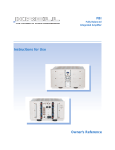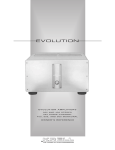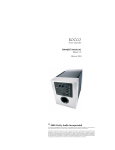Download Krell Industries Evolution One Stereo Amplifier User Manual
Transcript
EVOLUTION EVOLUTION MONAURAL POWER OWNER’S ONE AMPLIFIER REFERENCE Evolution One Monaural Power Amplifier Owner’s Reference, v05.0 Krell Industries, Inc. 45 Connair Road Orange, CT 06477-3650 USA TEL 203-799-9954 FAX 203-891-2028 E-MAIL [email protected] WEBSITE http://www.krellonline.com This product complies with the EMC directive (89/336/EEC) and the low-voltage directive (73/23/EEC). WARNINGS The amplifier must be placed on a firm, level surface where it is not exposed to dripping or splashing. The ventilation grids on the top of the amplifier and the space underneath the amplifier must be unobstructed at all times during operation. Do not place flammable material above or beneath the amplifier. Before making connections to the amplifier, ensure that the back panel power switch is down. Make sure all cable terminations are of the highest quality, free from frayed ends, short circuits, or cold solder joints. The differential circuitry employed with an Evolution One Monaural Power Amplifier requires special attention when connecting speakers. Do not connect the negative speaker terminals together. Do not connect the negative speaker terminals to ground. Do not connect an Evolution One Monaural Power Amplifier to a loudspeaker selector device that employs a common ground scheme, as it may short-circuit the amplifier output. THERE ARE NO USER SERVICEABLE PARTS INSIDE AN EVOLUTION ONE MONAURAL POWER AMPLIFIER. Please contact Krell if you have questions not addressed in this guide. This product is manufactured in the United States of America. Krell® is a registered trademark of Krell Industries, Inc., and is restricted for use by Krell Industries, Inc., its subsidiaries, and authorized agents. Evolution Bias™ is a trademark of Krell Industries, Inc. and is a Krell technology based on U.S. Patent No. 5,331,291. CAST™, Evolution CAST™, and Krell Current Mode™ are trademarks of Krell Industries, Inc. All other trademarks are registered to their respective companies. © 2005 by Krell Industries, Inc. All rights reserved P/N 307772 Contents List of Illustrations, page iv A Letter from Dan D’Agostino, page 1 SECTION ONE: About Krell, page 3 The Krell Legacy, Revolutionary Krell CAST Technology, Ensuring Maximum Performance, and Definition of Terms SECTION TWO: Unpacking and Placement, page 12 Opening the Evolution One Shipping Cartons SECTION THREE: Anatomy of an Amplifier, page 15 Features and Benefits of the Evolution One Design SECTION FOUR: Connecting an Evolution One Amplifier to Your System, page 19 CAST and Voltage Connections, Connection Steps, DC Protection Circuitry, and Remote Control Options SECTION FIVE: Amplifier Operation, page 22 Powering Up, Adjusting Power Meter Modes, Switching between CAST and Voltage Connections, Amplifier Care SECTION SIX: Amplifier Troubleshooting, page 26 WARRANTY, page 28 RETURN AUTHORIZATION PROCEDURE, page 30 SPECIFICATIONS, page 31 iii 1 List of Illustrations Figure 1, page 15 Evolution One Amplifier and Power Supply Chassis Front Panels Inset Evolution One Amplifier Channel: Front Panel View Figure 2, page 16 Evolution One Amplifier and Power Supply Chassis Back Panels Figure 3, page 17 Evolution One Amplifier Chassis Top Figure 4, page 18 Evolution One Power Supply Chassis Top iv A Letter from Dan D’Agostino Dear Audio Enthusiast, Thank you for your purchase of the Evolution One. The Evolution One Monaural Power Amplifier represents a watershed in my design philosophy and in my quest for amplifiers that deliver absolute truth in music reproduction. This new amplifier operates solely in the current domain, with only one voltage gain stage at its output. I have always been fascinated by the artistry inherent in great musical performances, and I believe that no component in an audio system equates more closely to the full range of musical expression than the power amplifier. The Evolution One reproduces real-life dynamics and transparency in a manner that I have not experienced prior to this design. It is my pleasure to make it available to you. Krell amplifiers are best known for their ability to drive any loudspeaker to sound its best, without regard to impedance or efficiency. The Evolution One amplifier joins this awesome current capability with a new, ultra-linear circuit topology. It is a strong belief of mine that linearity, an amplifier’s ability to output an exact duplicate of the input signal, is the ultimate measure of that amplifiers worth. I drive Krell amplifier designs toward the common goal of linearity; through the rigorous application of Krell design principles that focus our efforts on four major performance factors: distortion, bandwidth, output impedance and current capability. The Evolution One excels in each of these areas, delivering absolute accuracy from extremely low levels of output, virtually at preamplifier levels, to astounding, aweinspiring amounts of power. As the foundation of my new Evolution Series, the Evolution One Monaural Power Amplifier is designed to complement the Evolution Two Monaural Power Preamplifier perfectly. Combine the Evolution One and Two with my new LAT-1000 loudspeakers, and experience the extraordinary capabilities of the Evolution System. 1 continued (A Letter from Dan D’Agostino continued) I have some exciting news for you. Work on a new source component for the Evolution Series is ongoing as of this writing. Possessed of the unique Evolution technologies that power the amplifier and preamplifier, this Evolution source will expose the real advantages of the latest recording formats while taking compact disc playback to the next level. I encourage you to audition it as soon as it is released. Sincerely, Daniel D’Agostino Chief Executive Officer 2 SECTION ONE About Krell This section describes the Krell Legacy, innovative Krell amplifier design and technology, and defines key terms used in this reference. The Krell Legacy “I design every Krell component to set the standard for workmanship, style, and performance.” Dan D’Agostino High-end audio is a demanding pursuit—an ongoing quest for excellence in music reproduction that drives equipment manufacturers to strive for the absolute in design and performance. With a keen understanding of this passionate drive, Krell Industries, Inc., was founded in 1980. Over the past 2-1/2 decades, Krell has earned a distinguished reputation for engineering innovation and product excellence. The company’s history is replete with product introductions that have deeply impacted the high-end audio industry. The most discriminating audiophiles and product reviewers have consistently recognized Krell components for standard-setting performance. The Evolution One amplifier brings Krell design to a new level, setting a standard for performance that will not soon be matched. The shear breadth of this amplifier’s dynamic range capabilities conveys a startling realism that transcends previous designs. Seemingly unlimited frequency response, combined with unerring accuracy and fortitude, extend a tradition that began with the first Krell amplifier — the KSA-100. The KSA–100 was the first high-power, high-current, true Class A biased stereo power amplifier available to audiophiles. It was the first Krell product, and its resounding success established Krell as an important new technological contributor to high-end audio. 3 continued (SECTION ONE: About Krell continued) From the KSA–100 to the present, Krell C.E.O. Dan D’Agostino has continually “pushed the envelope” of performance in his search for greater amplifier power. His exploration of new technologies, driven by his never-ending quest to elevate the standard of excellence, has resulted in breakthrough audio designs. Over the years, the Krell line of power amplifiers, including benchmark products such as the KRS–100, KRS–200, and the Audio Standard models, has established a legacy of unparalleled sonic performance. The Krell product line has diversified, but Dan’s fundamental research into amplifier design and performance remains at the core of the company’s achievements. Every Krell component upholds the legacy, incorporating unique technologies that are the direct result of Dan’s discoveries in audio amplification. The Evolution One amplifiers build on the Krell legacy. They provide unprecedented linearity with the control and accuracy that only comes from superior current capability. The sound is lively and unconstrained, in a manner that evokes live performance and the true sound of instruments. Dan D’Agostino remains committed to the development of new designs and technologies. And the Krell legacy will continue to evolve with products that deliver innovative engineering, perfection in build quality, and outstanding audio performance. 4 Revolutionary Krell CAST Technology Current Audio Signal Transmission, termed CAST, is a revolutionary method of connecting analog audio components for unparalleled sonic performance. Innovative engineering combines the new Krell CAST circuitry with existing Krell Current Mode technology to create entire CAST systems that reproduce music with incredible range, tonality, and precision. The Voltage Signal Transmission and the Traditional Audio System Traditionally, signal is transmitted in the voltage domain between two components. In an audio system, each component is a discrete entity with unique characteristics that act upon the musical signal independently. Each component is unaware of the other components in the system. The cables that connect the components also have their own electrical characteristics, which affect the sonic presentation of the entire system. CAST transmission unifies individual components and interconnects into an electrically linked whole. The original signal remains unaltered from source to speaker. CAST Basics Here’s how a CAST audio system works. Internally, each CAST source transfers, or amplifies, current using Krell Current Mode circuitry. This current signal is then output using CAST circuitry. When the signal is received by a CAST input, Krell Current Mode circuitry again takes over until the signal reaches the loudspeaker. By maintaining the musical signal in the current domain from beginning to end, an entire CAST system behaves as if it is one component. With CAST, circuit board properties and signal transmission aberrations between components are eliminated. Cable impedances and their effects on the transmitted signal are non-existent. How CAST and Krell Current Mode Interact While CAST is a new method of transferring the musical signal between components, its origin stems from Krell Current Mode, the technology developed to transfer the musical signal within a component. CAST combined with Krell Current Mode takes circuitry signal transmission to the next evolutionary level. In essence, Krell Current Mode maintains the integrity of the signal within the component and 5 continued (SECTION ONE: About Krell continued) (How CAST and Krell Current Mode Interact continued) CAST preserves the transmitted signal between components. Together, CAST and Krell Current Mode technologies unify separate Krell components into a single global circuit. Krell Current Mode technology enjoys bandwidth increases up to an order of magnitude greater than their voltage based counterparts. This dramatic increase in circuit bandwidth delivers near perfection in the audible band that typically suffers from phase distortions in voltage circuits. CAST Cable Construction A CAST system uses cables manufactured by Krell and other manufacturers specially licensed by Krell. Thin and flexible CAST cables are constructed with the same build quality as other Krell components and are aesthetically matched to the components that Krell manufactures. An all-metal body and locking connectors with gold contacts are part of the standard no-compromise specification developed for every CAST cable made. Evolution CAST By employing radical current mirror circuitry, the Evolution components elevate the CAST technology to another level. This advanced use of the technology increases the linearity, transient speed, and bandwidth of the Evolution components while reducing the distortion by an order of magnitude. The Best Musical Performance When you operate a CAST system, you will hear significant improvements in every performance area: speed, precision, dynamic range, depth and width of the sound stage, transient impact, tonal balance, harmonic distortion, and more. The goal for CAST is the same company goal used for all Krell products. Krell strives for the delivery of the best performance of a musical event for you, using the full expression of technology to date. 6 Ensuring Maximum Performance “My pursuit of excellence in sound reproduction and my love of great musical performance has led me to the Evolution One Amplifier, and fuels the ongoing Evolution design effort at Krell.” Dan D’Agostino The Krell Evolution One Monaural Power Amplifier, built upon the foundation of huge, regulated power supplies and output stages, is designed to drive any loudspeaker with complete control. The product of breakthrough Krell technology, this amplifier provides a sound that is supremely dynamic and musical. Indeed, it is the sound of the music itself. Core Technologies Class A, Balanced, Current Mode Gain Topologies from Input to Output Audio signal voltages are converted to currents at the amplifier input, and the audio signal remains in the current domain throughout the entire amplifier until the output stages. All signal gain is realized in the current domain using proprietary multiple-output current mirrors with extraordinary open loop linearity. The current mirrors in the final gain stages use 36 pairs of high voltage, high speed transistors. Originally developed for demanding, high bandwidth video circuits, these transistors help yield gain stages with superb accuracy and very low distortion. The signal path is fully complementary and fully balanced from input to output. The driver and output stages use 28 pairs of 150 Volt, 14 Amp, 50 megahertz power transistors mounted on Krell-designed high efficiency heat sinks. All transistors operate in Class A mode. Independent complementary predriver and driver stages for the positive and negative output transistors make the output stages extremely fast and linear. The output stage develops 450 Watts into an 8 Ohm load, 900 Watts into 4 Ohms, and 1800 Watts into 2 Ohms. This unique circuit is impervious to low-impedance or reactive loads; the Evolution One amplifier simply drives any loudspeaker with absolute confidence, achieving the very best possible sonic results. 7 continued (SECTION ONE: About Krell continued) Impedance Advantage The output impedance of the final gain stages is one hundredth that of the final gain stage in most power amplifiers. This provides extremely wide bandwidth and very high current capability. The amplifier does not employ global negative feedback—the final gain stages use only 8 dB of local, nested negative feedback. This is one fivehundredth the amount used in most solid-state power amplifiers. The result is an extraordinarily open, liquid, effortless sound. Robust Power Supply Regulation For Absolute Voltage Stability The rails powering the amplifier’s low level and gain stages are regulated twice for total immunity from fluctuations in the AC mains and virtually noise-free output. All the regulators use current-mode circuitry for wide bandwidth, low output impedance, and complete immunity to varying load conditions. The high-current regulators powering the amplifier output stages use fully complementary gain stages and output drivers. The resulting wide bandwidth and low output impedance of the Evolution One surpasses even the stringent demands of the amplifier output stages. The driver and output stages in the high current regulators use 14 pairs of the same robust, high performance power transistors used in the amplifier output stages. All the regulators are located in the amplifier chassis to provide ultra low impedance supply rails for the audio circuitry. Evolution Bias Control Systems The new Evolution Bias system features 12 individual bias levels for optimum performance and efficiency. Evolution Bias constantly compares the audio signal at the input stage with impedance at the output stage, and adjusts the bias current accordingly. In addition, a proprietary bias monitor continuously measures and adjusts the output stage bias, eliminating the need for future adjustment or calibration. 8 Separate Power Supplies Are Quiet and Powerful Housed in a separate chassis, the power supply makes use of extensive electrical and magnetic shielding to keep radiated interference out of critical amplifier circuits. Internal high current line conditioning circuitry filters RF noise on the AC mains, as well as compensating for asymmetric power waveforms and DC on the mains. A dedicated 165 VA toroidal transformer with six independent secondary windings powers the amplifier’s low level stages, gain stages, and control circuitry. Power for the high current regulators and amplifier output stages comes from two massive 2500 VA toroidal transformers. These in turn drive eight 35-amp bridge rectifiers and 120,000 microfarads of filter capacitance. High reliability connectors with 56 machined, gold plated, 20-amp contacts transmit these tremendous power reserves to the regulators. Advanced Microprocessor Control Monitors Critical Operational Parameters If the DC level at the amplifier inputs exceeds a safe level, the microprocessor control automatically switches in DC blocking capacitors to prevent damage to the input stages or the loudspeakers. The microprocessor control measures the load impedance in real time to optimize the performance of the amplifier and power supply or, in the case of a short circuit, to shut the amplifier off. It monitors the regulator output voltages, the symmetry between the two halves of the balanced output stages, and it monitors the operating temperatures of the three main heat sinks. If any of the heat sinks become too hot, the microprocessor control adjusts the operating parameters of the amplifier and power supply to help the circuitry run cooler. If the temperature of any of the heat sinks becomes unsafe, the microprocessor control shuts the amplifier off until it cools down. In the event of a major protection fault the microprocessor flashes a diagnostic code on the power/stand-by LED (4). The RMS output voltage and current signals used by the microprocessor are also used by the power meter (6) (7), on the amplifier front panel, to display accurate power measurements. For more information on diagnostic codes, see Amplifier Troubleshooting, on page 26. 9 continued (SECTION ONE: About Krell continued) Definition of Terms Following are the definitions of key terms used in your owner’s reference manual. Inputs and Outputs Balanced A symmetrical input or output circuit that has equal impedance from both input terminals to a common ground reference point. The industry standard for professional and sound recording installations, balanced connections have 6 dB more gain than single-ended connections and allow the use of long interconnect cables. Balanced connections are completely immune to induced noise from the system or the environment. CAST and Evolution CAST Krell Current Audio Signal Transmission, or CAST, is a proprietary Krell circuit technology for connecting analog components, transmitting the audio waveform between components in the current domain rather than in the voltage domain. The speed and bandwidth provided by Krell CAST and its circuitry update, Evolution CAST, yield accurate, realistic music reproduction, enabling connected components to perform as if they are all part of a single circuit. Operation Off When the power breaker switch on the back panel of the power supply is in the down position, and the power/stand-by LEDs (4), the backlight (5), and the power meter scale (6) are not illuminated, the amplifier is off. Stand-by A low power consumption status that keeps the audio and regulator circuits at idle. The power/stand-by LEDs (4) are illuminated in red, when the amplifier is in the stand-by mode. Krell recommends leaving the amplifier in the stand-by mode when it is not playing music. 10 (Operation continued) Operational Mode When the power/stand-by LEDs (4), the backlight (5), and the power meter scale (6) are illuminated in blue, the amplifier is in the operational mode and ready to play music. Technology Krell Current Mode A proprietary Krell circuit topology in which the audio gain stages of a component operate in the current rather than voltage domain. This unique technology provides the component with exceptional speed, and a wide bandwidth. Evolution Bias A patented microprocessor control system that maintains Class A bias operation regardless of musical demand. Class A bias is the most accurate method used to amplify musical signals. Evolution Bias maximizes an amplifier’s efficiency both in power consumption and heat generation. 11 SECTION TWO Unpacking and Placement This section describes the procedures for safely unpacking and placing your Evolution One Monaural Power Amplifier. Each Evolution One amplifier channel is shipped in 2 cartons: a power supply chassis in 1 carton and an amplifier chassis in the other carton. Opening the Amplifier Shipping Carton Each Evolution One shipping carton measures 27.5 in. (69.9 cm) wide by 12 in. (30.5 cm) high by 20.8 in. (52.8 cm) deep and contains 1 amplifier power supply chassis or 1 amplifier chassis. Power Supply Chassis. The combined weight of the shipping carton and the power supply chassis is 110 lbs. (49.8 kg). Each power supply chassis measures 15.8 in. (40 cm) wide by 6.4 in. (16.1 cm) high by 20.5 in. (52.2 cm) deep and weighs 95 lbs. (43 kg). Amplifier Chassis. The combined weight of the shipping carton and the amplifier chassis is 70 lbs. (31.7 kg). Each amplifier chassis measures 15.8 in. (40 cm) wide by 6.2 in. (15.8 cm) high by 21.5 in. (54.7 cm) deep and weighs 55 lbs. (24.9 kg). To Remove the Chassis from the Shipping Carton 1. Open a shipping carton and remove the top layer of foam. You see these items: 1 Evolution One power supply chassis or amplifier chassis 1 packet containing the owner’s reference and warranty card 2. Orient the shipping box so that one person stands at the front of the carton and the other person stands at the back of the carton. 2 people needed 12 3. Simultaneously grasp the pair of cardboard handle cutouts at the front and back of the carton and lift the chassis straight up out of the carton. 2 people needed 4. Place the chassis in a safe location and remove the protective plastic wrapping. 2 people needed 5. Open the remaining 3 cartons of the Evolution One, using steps 1-4 above as a guide. 2 people needed 6. Place the power supply chassis where you intend to use the assembled amplifier channel. Krell recommends that you do not move the amplifier after it is assembled. 2 people needed 7. Locate the 4 locating pins (23) and the power connector (24) in the top plate of the power supply chassis. See Figure 4, on page 18. 8. Make certain the amplifier chassis feet (13) and the amplifier power connector (not shown) align with the 4 power supply locating pins and power supply power connector as you lower the amplifier chassis onto the power supply chassis. Use the outer edges of the amplifier and power supply chassis as a guide. The dimensions of the chassis are identical. When viewed from the top, the power supply chassis will disappear beneath the amplifier chassis, indicating proper alignment of the feet, pins, and power connectors. 2 people needed 9. Visually inspect the union between the amplifier and power supply chassis. Verify that the each of the amplifier chassis feet has descended upon the power supply chassis locating pins, and that both halves of the power connectors have mated squarely with one another. 10. Press firmly on the amplifier chassis to ensure that the connector is properly engaged. 13 continued (SECTION TWO: Unpacking and Placement continued) Placement Before you install an Evolution One amplifier into your system, please follow the guidelines in this section to choose its proper location. This will facilitate a clean, trouble-free installation. Each Evolution One amplifier requires at least two inches (5 cm) of clearance on each side and at least eight inches (20 cm) of clearance above the component to provide adequate ventilation. An Evolution One amplifier channel measures 15.8 in. (40 cm) wide by 12.5 in. (31.6 cm) high by 21.5 in.(54.7 cm) deep and weighs 150 lbs. (67.9 kg). Although Evolution Bias circuitry reduces the high heat dissipation and heat output of traditional Class A circuitry, Evolution One amplifiers still can become hot under normal operation. When the front and rear of a cabinet are open, the air space between the chassis and shelf must be unobstructed. If you place the amplifier in a closed cabinet, you may need to modify shelf spacing or use small fans to increase ventilation. Place the amplifier as close to the loudspeakers as possible. Although Krell CAST technology permits you to use interconnect cables of any length, try to keep the cable length to a minimum. All Evolution One amplifiers drive the lowest impedances with ease. When impedance is added due to long loudspeakers cable lengths, amplifier power is wasted in the cable. Long loudspeakers cables reduce the maximum power that is delivered in the loudspeakers. AC Power Guidelines Each Evolution One amplifier channel needs to be operated from a dedicated AC circuit rated at a minimum of 20 amps. A 30 amp AC circuit is preferable, but not required. Use the power cord shipped with the amplifier channel to make the AC connection. Operation with a power cord other than the one supplied by Krell may induce noise, limit current, or otherwise impair the amplifier’s ability to perform optimally. 14 SECTION THREE Anatomy of an Amplifier This section describes Evolution One features and benefits. Figure 1 Evolution One Amplifier and Power Supply Chassis Front Panels 1 5 6 7 8 50W CAST POWER 5000W 4 3 9 10 11 12 2 4 1 2 3 4 5 6 7 8 9 10 11 12 13 14 Amplifier Chassis Power Supply Chassis Power/Stand-by Button Power/Stand-by LED Backlight Power Meter Scale Power Meter Wand CAST LED 50 W Scale LED 5000 W Scale LED Cast/Balanced Button Meter Range Button Amplifier Feet Power Supply Feet Inset Evolution One Amplifier Channel Front Panel View 13 14 15 continued (SECTION THREE: Anatomy of an Amplifier continued) Figure 2 Evolution One Amplifier and Power Supply Chassis Back Panels 1 BALANCED INPUT CAST INPUT IN IN OUT EVOLUTION ONE KRELL INDUSTRIES, INC. 45 CONNAIR ROAD ORANGE, CT 06477-3650 USA MADE IN USA NO USER SERVICEABLE PARTS INSIDE 15 16 18 19 17 2 50/60 Hz EVOLUTION ONE KRELL INDUSTRIES, INC. 45 CONNAIR ROAD ORANGE, CT 06477-3650 USA NO USER SERVICEABLE PARTS INSIDE MADE IN USA 20 15 16 17 18 19 20 Balanced Input CAST Input Amplifier Binding Posts RC-5 Input 12 V Trigger In/Out IEC Power Cord Receptacle 21 Power Breaker Switch 16 21 Figure 3 Evolution One Amplifier Chassis Top 17 17 Amplifier Binding Posts 22 Amplifier Front 22 17 continued (SECTION THREE: Anatomy of an Amplifier continued) Figure 4 Evolution One Power Supply Chassis Top 23 24 23 23 Locating Pin 24 Power Connector 25 Power Supply Front 25 18 SECTION FOUR Connecting the Evolution One to Your System This section describes Evolution One amplifier connections and outlines remote control options. Each Evolution One has a CAST 4-pin connector, a balanced input via an XLR connector, a 12 Volt trigger In/Out connection, and an RC-5 input on the back panel. CAST Connections Krell recommends using its proprietary Krell CAST system for unparalleled sonic performance for connections between an Evolution One amplifier and other CAST-equipped components. Krell CAST uses flexible interconnecting cables that can be drawn through tight spaces and concealed. Balanced Connections Evolution One amplifiers also offer balanced connections. Balanced connections not only can minimize sonic loss but also are immune to induced noise, especially for installations using long cables. Cable Connection Steps The following steps describe how to connect cables to an Evolution One amplifier: 1. Turn off all power sources and components before connecting inputs and outputs. 2. Neatly organize wiring between to and from the amplifier and all components. Separate AC wires from audio cables to prevent hum or other unwanted noise from being introduced into the system. 19 continued (SECTION FOUR: Connections, continued) 3. Connect the Krell CAST cables from your CAST-enabled preamplifier or source component to the left and right Krell CAST 4-pin bayonet inputs (16) on the amplifier (1) back panel. For balanced operation, connect the interconnect cable from your preamplifier to the balanced XLR input (15) on the amplifier back panel. 4. Connect the loudspeaker cables to the amplifier binding posts (17), located on the amplifier back panel. Amplifier binding posts accept spade lugs only. 5. Insert the AC mains power cord plug into the IEC power cord receptacle (20), on the back panel of the power supply chassis. 6. Turn to Amplifier Operation, on page 22. Note If a CAST and balanced source are connected to the amplifier during the initial installation, the Evolution One amplifier defaults to CAST, when it is powered on. If only one source is connected, the amplifier will automatically select that source. For more information, see Switching Between CAST and Balanced Inputs, on page 23. DC Protection Circuitry / Using a Tube Preamplifier The Evolution amplifier has a built-in DC monitor that continuously monitors the audio signal at the input. If too high a level of DC is detected, the amplifier automatically mutes the output and engages DC coupling capacitors at the input stage. For more information about DC protection circuitry features, see Amplifier Troubleshooting, on page 26. 20 Remote Control Options The Evolution One amplifier is compatible with the remote controls included with the Krell Evolution Two preamplifier, other Krell preamplifiers or preamplifier/ processors, and it is compatible with the Universal Krell Touch Screen Remote. Please contact your authorized Krell dealer, distributor, or Krell, if you wish to purchase a separate remote control for the Evolution One amplifier. The following remote control options are available, for amplifiers installed outside of the listening area: RC-5 Remote Control Each Evolution One amplifier has an RC-5 remote input (18) on the back panel. The RC-5 remote input accepts a remote command enabling it to switch between stand-by and operational modes and to switch between CAST and balanced inputs. The RC-5 remote control is used with a third party remote control system that provides RC5 (IR) data with the carrier intact, via a wired connection. A stereo tip, ring, sleeve 1/8” mini connector is used in the following configuration: Tip = RC-5 data, Ring = +5 V, Sleeve = GND. 12 Volt Trigger The Evolution One amplifier has a 12 Volt trigger input/output connection (19) that sends and receives 12 VDC power on/off (12 V trigger) signals to/from other Krell components and other devices that incorporate a 12 Volt trigger. Mono 1/8” mini connectors are utilized with the following configuration: Tip = +12 V, Sleeve = GND. Notes When the Evolution One is in the operational mode, the 12 VDC Out provides 12 Volts of DC output. When the component is in the stand-by mode or off, the DC output is 0 Volts. A minimum of 30 mA is required to operate the 12 Volt trigger. 21 SECTION FIVE Amplifier Operation Evolution One amplifiers are easy to operate. However, it is important to exercise care during operation due to the enormous power output of each amplifier. Switching between active sources (such as a CD player or a recording device) without muting the preamplifier output, or bumping or miscuing a source can generate large transients at low frequencies. Evolution One amplifiers may generate enough power with these transients to damage loudspeakers. IMPORTANT Always mute or fully attenuate the preamplifier level when switching sources. Do not change input connections to the amplifier when the amplifier is on. Use care when setting high playback levels. Because of their tremendous reserves of clean power, Evolution One amplifiers can safely drive speakers to higher sound pressure levels than other amplifiers. Always lower the volume level at the first sign of loudspeaker distress. Powering On, Powering Down, and Powering Off When powering on any system, turn on amplifiers last. When powering down, turn off amplifiers first. Krell recommends leaving the Evolution One amplifier powered down (in the stand-by mode) between listening sessions. Turn the amplifier off using the power breaker switch (21) on the back panel of the power supply chassis (2), when the system is not being used for an extended period of time. The procedure for amplifier operation follows: 1. Insert the AC power cord plug into the dedicated wall outlet. 2. Move the power breaker switch to the up position, to place the amplifier in stand-by mode. The power/stand-by LEDs (4) on the amplifier and power supply chassis illuminate in red. 22 3. Press the power button (3), located underneath the far left edge of the amplifier chassis front panel. The power/stand-by LEDs (4) on the amplifier and power supply chassis illuminate in blue. The backlight (5) and the meter scale (6) on the amplifier chassis illuminate in blue. You may now switch between CAST and balanced operation. For more information, see Switching between Cast and Balanced Inputs, below. 4. With the preamplifier muted, or the volume control completely lowered, select a source. Increase the volume control to the desired listening level. 5. To place the amplifier in stand-by mode, press the power button (3) on the front panel. It is now safe to turn off the rest of the system. Switching Between CAST and Balanced Inputs If a CAST and balanced source are connected during the initial installation, see Cable Connection Steps, pages 19-20, the Evolution One defaults to CAST and the CAST LED illuminates in blue when the amplifier is powered on. If only one source is connected, the amplifier automatically selects that source. If the amplifier detects a balanced source, there is no illuminated LED. To switch between CAST and balanced inputs, press the CAST/Balanced button (11), located underneath the far right edge of the amplifier chassis front panel. CAST cables must be engaged for this function to be operational. 23 continued (SECTION FIVE: AMPLIFIER OPERATION continued) Adjusting Power Meter Modes The Evolution One amplifier uses microprocessors to monitor RMS output voltage and current signals. This information is output to a custom front panel power meter (6) (7), which displays an accurate power measurement for the selected meter range on the power meter scale (6). The power meter has 4 modes of operation accessed by the meter range button (12): 50 WATT range, 500 WATT range, 5000 WATT range, and OFF. There are two ways to cycles between the operational modes: Press the meter range button, located underneath the bottom right edge of the amplifier chassis front panel or, Press the select key (SEL) on the Evolution Two preamplifier, on another Krell preamplifier, or on the Universal Krell Touch Screen Remote. Scale Blue Front Panel LED Blue Backlight & Meter Scale Light 50 Watt 50W LED illuminates Illuminated 500 Watt* None Illuminated 5000 Watt 5000W LED illuminates Illuminated Off Meter is inactive Not illuminated *Factory default Power Meter Range and Power Meter Wand Action The power meter (6) (7) enables you to monitor the power output of the Evolution One amplifier. The 500 Watt scale is the factory default. The 50 Watt scale range is the most sensitive, and displays the smallest changes in power output, with the greatest physical movement of the power meter wand (7). Conversely, the 5000 Watt scale is the least sensitive, and displays the largest changes in power output, with the smallest physical movement of the power meter wand. Turning Off the Lights on the Amplifier Channel Front Panel When the meter range button (12) cycled to OFF, the lights on the front panels are not illuminated. 24 Amplifier Care An Evolution One amplifier is capable of enormous power output, and it is important to exercise care during system operation. Avoid any action that can generate large transient signals. Always mute the preamplifier output before switching between active sources or cuing an LP. Do not change inputs to the amplifiers while the amplifiers are on. Use care when listening at high volume levels. Because of their tremendous reserve of clean power, Evolution One amplifiers can drive loudspeakers to much higher sound pressure levels than other amplifiers without clipping. Always lower the volume level at the first sign of loudspeaker distress. Exercise great care when handling an amplifier — especially at the back panel. Rings, necklaces, bracelets, and other pieces of metal jewelry can conduct electricity. Consider removing them before touching any part of the back panel. 25 SECTION SIX Amplifier Troubleshooting System Protection Each Evolution One amplifier has a built-in DC monitor that continuously monitors the audio signal at the input, as well as other sophisticated protection circuits that monitor other areas of the topology, in order to safeguard the amplifier. This circuitry constantly evaluates the operation of the amplifiers and provides protection against potentially damaging DC input or output and short circuits. Regulator operation is also continuously monitored to ensure constant voltage to the output stage. These protective systems are designed to prevent damage to Evolution One amplifiers or loudspeakers caused by other defective components, faulty wiring, system mishandling, or amplifier failure. 26 Evolution One amplifiers report operational issues by flashing the power/stand-by LEDs (4) in red, in a specific sequence, or by tripping the rear panel breaker (21), as follows: Diagnostic Codes Possible Condition Course of Action 1 flash, pause, 2 flashes, repeat; then the amplifier reverts to stand-by mode Amplifier is over temperature Allow the amplifier to cool. When the LEDs stop flashing, the amplifier has cooled down. flash, pause, 5 flashes, repeat; then the amplifier reverts to stand-by mode Short circuit on output Check all connections at the amplifier and loudspeaker binding posts. Cycle the power breaker switch (21) on the power supply and attempt to power on the amplifier. Call the factory if the problem persists. 1 flash, pause, 7 flashes, repeat; then the amplifier reverts to stand-by mode Line frequency error: The amplifier is set for 60 Hz, but is attempting to operate via a 50Hz system. Contact your local authorized Krell dealer or distributor. Output mutes while music is playing, and then sound resumes. DC detected at input during playback. Input capacitors are automatically engaged. Check source and preamplifier for excessive DC output. Once DC has been eliminated, cycle the power breaker switch (21) to disengage the input capacitors. The power breaker switch (21) trips; then the amplifier powers off. The amplifier repeats this action when powered on. Possible component failure. Contact your local authorized Krell dealer or distributor, or the Krell Service Department. 27 Warranty Each Evolution Series amplifier has a limited warranty of five years for parts and labor on circuitry. Should this product fail to perform at any time during the warranty, Krell will repair it at no cost to the owner, except as set forth in this warranty. This warranty does not apply to damage caused by acts of God or nature. The warranty described on this page shall be in lieu of any other warranty, expressed or implied, including, but not limited to, any implied warranty of merchantability or fitness for a particular purpose. There are no warranties which exceed beyond those described in this document. If this product does not perform as warranted herein, the owner’s sole remedy shall be repair. In no event will Krell be liable for incidental or consequential damages arising from purchase, use, or inability to use this product, even if Krell has been advised of the possibility of such damages. Proof of purchase in the form of a bill of sale or receipted invoice substantiating that the unit is within the warranty period must be presented to obtain warranty service. The warranty begins on the date of the original retail purchase, as noted on the bill of sale or receipted invoice from an authorized Krell dealer or distributor. Previously owned equipment, when re-purchased from an authorized Krell dealer or distributor, has the balance of the original warranty, based on the original date of manufacture. The warranty for Krell products is valid only in the country to which they were originally shipped, through the authorized Krell distributor for that country, and at the factory. There may be restrictions on or changes to Krell’s warranty because of regulations within a specific country. Please check with your distributor for a complete understanding of the warranty in your country. If a unit is serviced by a distributor who did not import the unit, there may be a charge for service, even if the product is within the warranty period. Freight to the factory is your responsibility. Return freight within the United States (U.S.A.) is included in the warranty. If you have purchased your Krell product outside the U.S.A. and wish to have it serviced at the factory, all freight and associated charges to the factory are your responsibility. 28 Krell will pay return freight to the U.S.A.-based freight forwarder of your choice. Freight and other charges to ship the unit from the freight forwarder to you are also your responsibility. Krell is not responsible for any damage incurred in transit. Krell will file claims for damages as necessary for units damaged in transit to the factory. You are responsible for filing claims for shipping damages during the return shipment. Krell does not supply replacement parts and/or products to the owner of the unit. Replacement parts and/or products will be furnished only to the distributor performing service on this unit on an exchange basis only; any parts and/or products returned to Krell for exchange become the property of Krell. No expressed or implied warranty is made for any Krell product damaged by accident, abuse, misuse, natural or personal disaster, or unauthorized modification. Any unauthorized voltage conversion, disassembly, component replacement, perforation of chassis, updates, or modifications performed to the unit will void the warranty. In the event that Krell receives a product for warranty service that has been modified in any way without Krell authorization, all warranties on that product will be void. The product will be returned to original factory layout specifications at the owner’s expense before it is repaired. All repairs required after the product has been returned to original factory specifications will be charged to the customer, at current parts and labor rates. All operational features, functions, specifications, and policies are subject to change without notification. To register your product for warranty benefits, please complete and return the Warranty Registration Card enclosed in the shipping box within 15 days of purchase. Thank you. 29 Return Authorization Procedure If you believe there is a problem with your component, please contact your dealer, distributor, or the Krell factory to discuss the problem before you return the component for repair. To expedite service, you may wish to complete and e-mail the Service Request Form in the Service Section of our website at: http://www.krellonline.com To contact the Krell Service Department TEL 203-799-9954, Monday-Friday 9:00 AM to 5:00 PM EST FAX 203-799-9796 E-MAIL [email protected] WEBSITE http://www.krellonline.com Evolution One PRODUCT MODEL NUMBER SERIAL NUMBER To return a product to Krell, please follow this procedure so that we may serve you better: 1. Obtain a Return Authorization Number (R/A number) and shipping address from the Krell Service Department. 2. Insure and accept all liability for loss or damage to the product during shipment to the Krell factory and ensure all freight (shipping) charges are prepaid. The product may also be hand delivered if arrangements with the Service Department have been made in advance. Proof of purchase will be required for warranty validation at the time of hand delivery. IMPORTANT Use the original packaging to ensure the safe transit of the product to the factory, dealer, or distributor. Krell may, at its discretion, return a product in new packaging and bill the owner for such packaging if the product received by Krell was boxed in nonstandard packaging or if the original packaging was so damaged that it was unusable. If Krell determines that new packaging is required, the owner will be notified before the product is returned. To purchase additional packaging, please contact your authorized Krell dealer, distributor, or the Krell Service Department for assistance. 30 Specifications Frequency response 20 Hz to 20 kHz ±0.05 dB 0.6 Hz to 220 kHz +0, –3 dB Inputs 1 balanced via XLR connector 1 CAST via 4-pin bayonet connector Signal-to-noise ratio 118 dB, “A”-weighted Outputs 1 pair Krell binding posts Gain 25.8 dB Dimensions Amplifier chassis: 15.8 in. W x 6.2 in. H x 21.5 in. D 40 cm W x 15.8 cm H x 54.7 cm D Total harmonic distortion <0.01% at 1 kHz, at 450 W, 8 Ohms <0.1% at 20 kHz, at 450 W, 8 Ohms Power supply chassis: 15.8 in. W x 6.4 in. H x 20.5 in. D 40 cm W x 16.1 cm H x 52.2 cm D Input impedance Balanced: 100 kHz CAST: 50 Hz Amplifier channel: 15.8 in. W x 12.5 in. H x 21.5 in. D 40 cm W x 31.6 cm H x 54.7 cm D Input sensitivity Balanced: 3.08 V RMS CAST: 3.08 mA RMS Weight Amplifier chassis: Shipped: 70 lbs., 31.7 kg Unit Only: 55 lbs., 24.9 kg Output power 450 W RMS at 8 Ohms 900 W RMS at 4 Ohms 1800 W RMS at 2 Ohms Power supply chassis: Shipped: 110 lbs., 49.8 kg Unit Only: 95 lbs., 43 kg Output voltage 170 V peak-to-peak 60 V RMS Output current 57 A peak Slew rate 100 V/us Power consumption Standby: 225 W Idle: 300 W Maximum: 3600 W 31















































